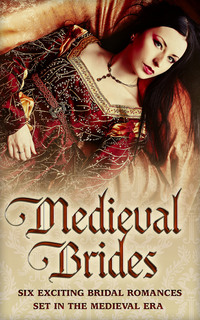Kitap dosya olarak indirilemez ancak uygulamamız üzerinden veya online olarak web sitemizden okunabilir.
Kitabı oku: «Medieval Brides», sayfa 4
‘Don’t get too comfortable, Félix. I’ve a commission for you,’ Sir Adam said.
His voice gradually faded as he and his subordinate moved away. ‘I want you to rustle up a couple of sharp-eyed volunteers…’
Wishing she had more time to get used to the day’s turn of events, for her head was spinning, Cecily stumbled towards the cookhouse. Lifting the wooden latch, she was instantly enveloped in a comforting warmth.
Yellow flames flickered in the cooking hearth, and grey smoke wound up to the roof-ridge. A fire-blackened cauldron was hanging over the centre of the fire on a long chain suspended from a cross beam. At the hearthside, a three-legged water pot was balanced in the embers, bubbling quietly. Some chickens were roasting on a spit. Cecily inhaled deeply. Roast chicken and rosemary. The chickens were not destined for the novitiate, but that didn’t prevent her mouth from watering.
Two novices were in charge of that evening’s meal—Maude, Cecily’s only true friend at the convent, and Alice. With one hand Maude was stirring the contents of the cauldron, and with the other she steadied it with the aid of a thick cloth. Her skirts and apron were kilted up about her knees, to keep them clear of the flames, while her short leather boots—serviceable ones, like Cecily’s—protected her feet from straying embers. As was Cecily’s habit when working, Maude had rolled up her sleeves and discarded her veil and wimple. A thick brown plait hung down her back, out of the way. Dear Maude.
Alice was kneading dough at a table, shaping it into the round loaves Mother Aethelflaeda so liked. Alice’s loaves would be left to rise overnight, and in the morning they would be glazed with milk and finished with a scattering of poppy seeds.
It was part of a novice’s training to learn all aspects of life in the convent, and Cecily knew how to make the loaves, as well as the many varieties of pottage that the nuns ate. Pottage was the usual fare, unless it was a saint’s day—or, Cecily thought ruefully, one was fasting or doing penance. This evening the aroma coming from the stockpot was not one of Cecily’s favourites, yet on this shocking, disturbing, distressing evening it was strangely reassuring to observe the familiar routine.
Here, in the cookhouse, all seemed blessedly normal. So normal it was hard to believe that a troop from Duke William’s army had just invaded St Anne’s.
‘Turnip and barley?’ Cecily asked, wrinkling her nose.
Maude nodded. ‘Aye—for us. There’s roast chicken for Mother Aethelflaeda and the senior sisters.’
‘We’ve guests,’ Cecily told her. ‘They’ll want more than barley soup.’
‘I know. So I saw.’ Maude grinned and ruefully indicated a reddened cheek that bore the clear imprint of Mother Aethelflaeda’s hand. Wiping her forehead with the pot cloth, she continued, ‘Mother beat you to it, and she made a point of insisting that the foreign soldiers were to have the same as us novices. Oh, except they can have some of that casked cheese…’
‘Not that stuff we found at the back of the storehouse?’
Maude’s grin widened. ‘The same.’
‘Maude, we can’t. Is there none better?’ Cecily and Maude had found the casket of cheese, crumbling and musty with mould, when clearing out the storehouse earlier in the week. It looked old enough to date back to the time of King Alfred.
Maude winced and touched the pot cloth to her slapped cheek. ‘Not worth it, Cecily. She’ll check. And think how many Ave Marias and fast days she’d impose upon you then…’
‘No, she won’t. I’m leaving.’
And while Maude and Alice turned from their work to goggle at her, Cecily quickly told them about her sister Emma and her sad news; about Emma’s proposed marriage to Sir Adam and her subsequent flight; about the reason for Sir Adam’s arrival at St Anne’s; and finally—she blushed over the telling of this—about her indecorous proposition to a Breton knight she’d only set eyes on moments earlier.
‘So you see, Maude,’ she finished on a rush, ‘we must say our goodbyes this night, for I’ll be leaving with these knights in the morning—before Prime. I’m returning to Fulford.’
While Maude still gaped at her, Cecily turned for the door. ‘Mind that pottage, Maude. You’ve not stirred it in an age.’
Cecily snatched a few moments in the chilly gloom of the chapel to try and calm herself and come to terms with her new circumstances. It was not easy. She was about to leave a quiet, ordered, feminine world of prayer and contemplation and re-enter the world that she had left behind—her father’s world. She shivered. Her father’s world was a warrior’s world, a noisy, messy, intemperate world, where real battles were fought and blood was spilled.
And that, she reminded herself, as she stared at the altar cross shining in the light of a single candle, was why she was returning. Someone had to look out for her baby brother and her father’s people. It had been a wrench to leave the world outside the convent walls and, though she had no great love for life at St Anne’s, she did not expect her transition back into it would be easy.
In the way of warriors, one warrior in particular—one from across the sea—kept pushing his way to the forefront of her mind. Wincing, she recalled her proposition to him—worse, she recalled that he had ignored it. Something about Sir Adam disordered her thoughts. But she was going to have to overcome her fear of that if she was to be of use to Philip and the people of Fulford.
Cecily’s thoughts remained tangled, and all too soon she was interrupted by Maude, come to tell her that it was time they served the convent’s unlooked-for guests with their evening meal.
The soldiers—about a dozen—sat round a hastily erected trestle in the guest house. The instant Cecily walked through the door she registered that SirAdam was sitting next to Sir Richard, on a bench at the other end of the table. Deliberately, she kept her gaze elsewhere.
Tallow candles had been hunted out of storage and stuck in the wall sconces. They guttered constantly, and cast strange shadows on the men’s faces—elongating a nose here, the depth of an eye socket there. A sullen fire hissed in the central hearth, and clouds of smoke gusted up to the vent in the roof, but several weeks of rain had seeped into both thatch and daub. It would take more than one night’s fire to chase away the damp.
The men were talking easily to one another and laughing, seemingly perfectly at ease having found some shelter in their new country. Their voices, masculine voices, sounded strangely in Cecily’s ears after years of being attuned only to women. Her hands were not quite steady. A fish out of water, she did not know what to expect. It was most unsettling. Shooting them subtle sideways glances, she tried not to stare at the shaved cheeks and short hair which made boys of them all. But some of them were young in truth—and surely too young to shave? She wondered how much of their manner was simply bravado.
Moving about the table as unobtrusively as possible, Cecily set out tankards of the ale that was usually served with meals. It was too chancy to drink water straight from the well. She continued to avoid Sir Adam’s gaze.
More than anyone else at the convent, she had no good reason to welcome him and his troop, but Mother Aethelflaeda’s parsimony was shaming. Did he set his poor welcome at her door? She hoped not, because she dared not court his dislike—not when she was reliant on him to take her to Fulford.
The sisters had beeswax candles aplenty in the chapel—why couldn’t they have brought out some of those? Beeswax candles burned more evenly, and gave off a pleasant scent that was a world away from the rank stink of tallow. It wouldn’t have hurt to be more hospitable. Tallow candles were used mainly by the peasantry; they were cheap, and they spat and sputtered and gave off cloying black smoke. The room was full of it. To make matters worse, the Prioress had had all the dry wood bundled into the sisters’ solar and had insisted they used green wood for the guest house fire. The result was inevitable: a spitting fire and yet more smoke.
Sir Richard coughed and waved his hand in front of his face. ‘It’s worse than the Devil’s pit in here,’ he said. He spoke no less than the truth.
Cecily shot a covert look across the trestle at Sir Adam. He was leaning on his elbow, quietly observing her. He murmured noncommittally to his friend, his eyes never leaving her.
Flushing, she ducked her head and hurried over to the cauldron of pottage. She concentrated on ladling out the broth into shallow wooden bowls and tried, unsuccessfully, to ignore him. To think that she had proposed marriage to him…What must he think of her?
‘Where’s Tihell?’ Sir Richard murmured.
Intent on her ladling, Cecily missed Sir Adam’s swift headshake. ‘Oh, just a small errand.’
Sir Richard lowered his voice further, and Cecily thought she heard her sister’s name. She strained to hear more, but Sir Adam’s response was inaudible, and out of the corner of her eye Cecily thought he briefly touched his forefinger to his lips.
Maude slapped the mouldering cheese and several loaves of that morning’s baking on the trestle.
Sir Richard took a sip of his ale and grimaced. ‘Saxon swill,’ he muttered. ‘Never wine. Even mead would be better than this.’
Aside from Sir Richard’s comments about the lack of wine, Cecily heard no other complaints. But when she put a steaming bowl of broth before Adam Wymark she distinctly heard his stomach growl. Acutely aware of the lack of meat in the pottage, and the fact that they had been ordered to offer novice’s portions, which would not fill her stomach, let alone that of a tall, active man like Sir Adam, Cecily finally met his gaze.
‘Mother Aethelflaeda’s generosity knows no bounds,’ he said dryly, breaking off a hunk of bread and dipping it into his bowl.
‘Mother Aethelflaeda bade me tell you that our order has been impoverished by the warring,’ Cecily said. ‘She conveys her apologies for the simplicity of our food.’
‘I’ll lay odds she also said that since we are God-fearing men we will not mind Lenten fare instead of a meal.’
Sir Adam’s assessment was so close to the truth that Cecily was hard put not to smile. Demurely, she nodded. ‘Aye, sir. Mother Aethelflaeda also said that in the case of you and your men such fare would be especially apt, as every man who fought at Hastings should do a hundred and twenty days’ penance for each man that he has killed.’
He stared at her, chewing slowly; Sir Richard choked on his ale; a man-at-arms guffawed.
A dark eyebrow lifted. ‘Did you know that His Holiness the Pope did bless our cause over that of your Earl Harold the oath-breaker?’ Sir Adam asked.
‘I did not.’
‘No, I thought your Prioress would keep that interesting titbit to herself.’ He reached for the cheese platter, and eyed the cheese for a moment before sliding it away, untouched. ‘Tell me, Lady Cecily, do all the nuns eat this…this…fare?’
‘We novices do, sir—save for the cheese.’
‘You call this cheese?’
‘Yes, sir.’
Unexpectedly, a grin transformed his face. ‘You save that for special guests, eh?’
Cecily hid a smile. ‘Yes, sir.’
‘Do all in your order eat like this?’
Thinking of Mother Aethelflaeda’s chickens, roasting on the spit, Cecily was careful to avoid Maude’s eye, but her burning cheeks betrayed her.
‘Aye,’ he murmured. ‘A proud Saxon lady that one. One who would deny us what she may. I could swear I smelt chicken earlier.’
Cecily shot him a sharp look, but he met her gaze blandly.
Mumbling a reply, Cecily beat a hasty retreat and returned with relief to ladling out the pottage.
By insisting that Maude hand out the remaining platters she managed to avoid talking to Sir Adam for the rest of the meal. Out of the corner of her eye she watched him converse with Sir Richard. Not long after that, as soon as she decently could, Cecily murmured her excuses and left the new Lord of Fulford to bed down for the night. She had a few hours left in which to accustom herself to the idea of placing herself at the mercy of the man who had come to take her father’s lands. She prayed that it would be long enough.
What had she done?
Chapter Five
Next morning, Adam woke when the day was but a faint streak of light in the east. The guest house floor was unforgiving, and the cold had seeped through to his bones. Grimacing, he stretched, noted that his squire Maurice Espinay was up before him, and that the tantalising smell of fresh baked bread was floating in from the cookhouse.
His stomach grumbled. Hunger had been his constant companion since Hastings—the more so because he did not permit his men to ravage the countryside. Most Norman commanders saw it as their right, but Adam could not see the sense in looting and pillaging a village if one ever planned to rule it. Hopefully, when he and his men were settled, they could leave hunger behind.
AsAdam unwound himself from his cloak, he saw in his mind’s eye the lively dark eyes and the smiling mouth of Gwenn, his dead wife and his love. He thought about her most on waking. In the early days of his grief he had tried to discipline himself not to think of her, but as a strategy that had proved useless. Grief was a sneaky opponent. On the rare mornings he had succeeded in pushing Gwenn’s memory away, the grief had simply bided its time and crept up on him later, when he had not been braced for it. So, sighing, Adam had given himself permission to think about Gwenn first thing, since that was when he woke expecting to find her at his side.
Some mornings were more bearable than others. Even though it was two years since Gwenn had been laid to rest in the graveyard at Quimperlé, there were times when the grief was as fresh as though she had died but the day before; times when it was impossible to believe that never again would he look into those smiling, loving eyes. Ah, Gwenn, he thought, relieved that this looked as though it was going to be one of the more bearable mornings. Today he was going to be able to think of her sadly, to be sure, but without the lance of pain that had so crippled him in the weeks immediately following her death.
Briskly, Adam rubbed his arms to get his circulation going. His stomach growled a second time and his lips curved into a twisted smile. Gwenn was spared further suffering—she was safe beyond cold, beyond hunger—but he most definitely was not. Wryly he wondered what crumbs Mother Aethelflaeda would throw them for breakfast.
Shivering, he washed in the icy brackish water Maurice carried into the guest house in an ewer. Then, after eating a meagre nuns’ breakfast of bread and honey, washed down with small ale of a bitter brewing, he left the lodge with Richard to arm himself for the ride to Winchester and thence to Fulford. His stomach still rumbled. The poppyseed bread had been mouthwateringly good—fragrant and warm from the oven, not the crumbs he had feared being given—but there had not been enough of it. Not nearly enough.
Daylight was strengthening by the minute, and a light frost rimmed the horse trough white. As the two knights walked towards the stable their breath huffed out like mist in front of them. Glancing skywards, Adam noted some low-lying cloud, but thankfully the rain was holding off. Rain played havoc with chainmail, and his was in sore need of an oiling. It was not Maurice’s fault. Emma Fulford’s precipitous flight had left them with no time to pause for such niceties.
Where was Cecily Fulford? he wondered. She should have put in an appearance by now. Prime could not be far off. He conjured up her image in his mind and her blue eyes swam before him, her lips pink and kissable as no novice’s had any right to be—except that she was always worrying at them with those small white teeth. Worrying, worrying. Where had she slept? In a cell on her own? Or in a dormitory full of other novices? Had she been as cold as he? Had she broken her fast with fresh poppyseed bread?
‘We can’t afford to take any risks going through Winchester,’ Adam said, once Maurice had him armed. Their helms dangled from wooden pegs and their long shields were stacked with several others against a partition. ‘I don’t want a seax in my ribs.’
With his mail coif heavy about his neck, he leaned against a stall and watched Richard’s squire, Geoffrey of Leon, do the honours with his friend’s chainmail.
Straw rustled underfoot. ‘Nor I,’ Richard mumbled, emerging red-faced through the neck of the chainmail.
Maurice led the destriers out. Their hoofbeats initially rang loud on the stone flags in the stable, but when they reached the beaten earth in the yard the hoofbeats changed, became muted.
‘Maurice?’ Adam leaned through the stable door. ‘Commandeer a pillion saddle from the Prioress.’
‘Yes, sir.’
‘And don’t take no for an answer.’
‘No, sir.’
‘Put the saddle on Flame, when you find it. Oh, and Maurice—?’
‘Sir?’
‘Charge Le Blanc with guarding our rear on the road, will you? You can keep watch ahead. If anyone attacks, it’s possible they’ll do it in Winchester.’
He ducked back into the stable. Lady Cecily Fulford. He was glad she was to accompany them. Her presence would be invaluable—and not just for her help with the language. Where was the girl? Impatient with himself for letting musings on Cecily Fulford’s whereabouts distract him from the business at hand, Adam rolled his shoulders so his chainmail sat more comfortably. He trusted that she had not changed her mind about going with them…he wanted her to go with them, he realised. Purely as an interpreter—nothing more, naturally. She would be most useful.
Richard reached for his sword belt. ‘I agree we should keep a sharp lookout, Adam, but I disagree about Winchester being a point of possible ambush. The Duke’s men already have it garrisoned. And the streets are far too narrow—any fighting would mean the certain death of women and children, not to mention damage to property. I don’t think the Saxons would risk that—’
Adam shook his head. ‘You’re forgetting, Richard—Winchester’s the heart of Wessex. Harold and his kin have made it their capital for decades: there’s a great cathedral, royal palaces—loyalty will be at its strongest in the city. No, we’ll watch our backs most diligently when we pass through there.’
Richard grunted and buckled on his sword. ‘You’re the one in command.’
Adam smiled and clapped Richard on the shoulder. ‘My thanks for your support, my friend. Without it I…Suffice it to say I’ll not forget it.’
‘Heavens, man, you’re the hero who rallied the Breton cavalry. All I did was inform the Duke of your actions.’ He shrugged. ‘Besides, I have plenty of lands in Normandy already. My time here will come. I’d as lief support you as anyone.’
‘My thanks.’ Adam frowned out into the courtyard. ‘Any sign of my lady Cecily?’
‘Your lady, is she?’ Richard grinned. ‘Will you wed her in her sister’s place?’
‘If I can’t track down the sister I just might.’
‘I suppose one Fulford wench is as good as another?’
‘This one may be better, since she has offered herself to me.’
‘Adam, you don’t have to wed either of them if they don’t please. The Duke gifted Fulford Hall and the lands to you unconditionally. All you had to do was swear fealty to him. You hold title to them now.’ He tilted his head to one side and looked thoughtfully at Adam. ‘In fact, you might do better to look elsewhere, since the novice has no dower. Marrying her won’t fill empty coffers.’
Adam nodded. ‘That’s true. But it would help my cause at Fulford if I were to wed one of Thane Edgar’s daughters.’
‘Then take the little novice, Adam, since she has offered. I can see that she appeals…’
Aye, damn her, she more than appeals, Adam thought as he went to find her and hurry her along. He could wish that she didn’t appeal—he needed to keep his heart whole. He had given his heart once before, to his beautiful dark-eyed Gwenn. Pain sliced through him, hitting him off-guard. Never again. Never would he put his happiness in the hands of one woman.
Speaking of women—where had that novice got to? If they were to reach Winchester by noon, as he had planned, they must leave at once. He had urgent despatches for the Duke, and he did not think Novice Cecily would enjoy it if they had to gallop the entire way to the city.
The herb garden behind the chapel was reached via an arch through a high wattle fence, and it was there that Adam found her. He paused under the arch, watching her slight form as she made her way up one of the turf paths between the beds. Lady Cecily Fulford, Saxon noblewoman. Her footprints left tracks in the melting frost.
How tiny she was. He’d noticed yesterday that she barely reached his shoulder, but today, in the garden, she looked smaller still. She was clad in her novice’s habit and veil, and that thin cloak. Perhaps that was all she had—but it wasn’t much considering she was a thane’s daughter, an aristocrat. What would she think, he wondered, if she knew that he did not have a drop of noble blood in his veins? Would she turn tail, as her sister had done? Would she lift that little nose of hers and…? Certainly she would not have made that impetuous proposal if she knew of his humble origins. But…Impatiently, he shook his head. Such thoughts were pointless.
Being the end of the year, nothing in the herb garden was growing: the twiggy remnants of some herb poked out of the ground here; brown, frost-scorched root-tops wilted there. Adam was no gardener, but he could see that this garden had been carefully laid out and tended. In the centre stood a gnarled and leafless apple tree. A small bundle lay at its foot.
Lady Cecily had yet to see him. Hardly breaking step, she bent to pull some red hips off a straggling briar and tucked them absently into the folded-back sleeve of her habit. It was a nun-like gesture. She moved on; she straightened a stake.
Watching how she gazed at the sleeping plants, Adam saw love for the garden in every line of her body, in the caressing way her fingers trailed over a rosemary bush, a bay tree…He shifted his stance against the fencing, struck with an uncomfortable thought. Was his desire to take this woman with him as his interpreter pure selfishness? Was he standing in the way of a true vocation? Watching her in this garden he had second thoughts, but yesterday—yesterday in the lodge—he had not gained that impression.
No, he was not doing wrong to take her. There was no love lost between Cecily Fulford and the Prioress, and no sign of a great vocation either. Cecily Fulford might love this garden, but she did not love the convent. She had asked to go with him, which in itself was something of a mystery. There would be other gardens. For his part, he must be on his guard, lest his attraction to her person made him forget that she must have her reasons for suggesting she married him. And not for one moment would he forget the pain that loving could bring—that aching void after Gwenn had died. Not even for beauty such as Lady Cecily’s would he go courting that a second time. He would wed Cecily Fulford if she agreed, with gladness, but this time he would think of it as a business transaction. He would keep his heart out of it.
A robin landed on a branch of the apple tree. Pushing himself away from the arch, Adam cleared his throat and called her by her secular name—her true name. ‘Lady Cecily?’
The robin took flight; she turned and, seeing him, took a hasty pace back. His chainmail—she misliked it. He had been right to remove it yesterday.
Her cheeks were white as alabaster. He saw her swallow. ‘Y-you are ready to leave, Sir Adam?’
‘Aye.’
‘I also am ready. I said my farewells yesterday.’ She came towards him via the apple tree, resting her hand on the bark as she retrieved the bundle.
He took it from her, noting that she was careful to avoid contact with his fingers. ‘This is everything?’
She nodded, eyes wary, still absorbing his changed appearance. Did she fear him? Or, worse, hate him? Adam wanted her to think kindly of him, but since he had arrived in her life as a conqueror he acknowledged the difficulties. No, he was not so naïve as to think that Cecily Fulford had proposed because she liked the look of him. She must have some ulterior motive in mind. Seeing Fulford Hall again? Caring for her father’s people? Escaping from the convent?
He glanced at her mouth, at the rosy lips turned up to him, and wondered at a world that would see such beauty wither unseen behind high convent walls. Madness—it was nothing less than madness. Those lips were made for kissing, and he—out of the blue a shocking thought took his breath—he wanted to be the one doing the kissing…
Abruptly, he looked away. What was happening here? One moment he was missing Gwenn, and the next…His mind raced. Perhaps he should not have kept himself faithful to Gwenn’s memory. Richard had warned him that celibacy turned men’s minds. Perhaps Richard was right.
This girl was a novice, for pity’s sake, an innocent. He must control himself. He might be aware of her in a carnal sense, and she might have asked him to marry her, but he would be damned if he would accept until he had discovered her true motives.
‘You haven’t the weight to handle one of our horses on your own,’ he said in commendably cool tones. ‘Would you be content to ride pillion behind one of the men? Our saddles are fashioned for battle, but if we can’t find a pillion saddle I am sure we can put something together.’
‘Oh, no,’ Cecily said. She felt her cheeks grow hot. ‘That is…I couldn’t…’
Before entering the novitiate Cecily had been taught to ride pillion, as all ladies were. But it had been over four years since she had ridden—pillion or otherwise—and she did not think she still had the knack. Would she be riding astride? Or side saddle? Either way filled her with alarm. To ride astride behind one of these…these invaders would surely be seen as unseemly—and yet if she rode side saddle she’d be in the mud in no time…
His dark brows came together. ‘You do not like horses?’
‘Oh, no—I do like them. But I am woefully out of practice. And yours are so large. Could I take Mother Aethelflaeda’s pony?’
‘I asked, but she refused to lend it.’ Briefly his green eyes lit up. ‘No doubt she thinks I’ll mince it and feed it to the dogs.’
‘But, sir—’
He turned and, brushing her protests aside, ducked under the arch. ‘We’ll find something suitable.’
With a scowl, Cecily followed, her eyes fixed on Adam’s mail-clad back. Ride pillion behind one of his men? No, no, no. It was one thing to race across the downs with her brother Cenwulf as a child, but then she had been riding her own gentle Cloud, not clinging to one of Sir Adam’s men astride a hulking great warhorse. And she would certainly not—her cheeks positively flamed—perch behind him, the strange Breton knight who had come to lay claim to her father’s lands.
The yard was a mill of armed and mounted men. Harness jingled as the destriers tossed their heads and stamped great dints in the earth. With their helms on, Cecily could not recognise any of the men and boys from the previous night. All were terrifying alien beings, with loud voices and metal weapons that gleamed in the morning light. They looked prepared for anything.
Her heart thumped. Was she really going with these foreigners? She must be mad. For a moment the coward in her had the louder voice, urging her to remain safely in the convent. What if her countrymen attacked them? Of all in their party she would be the only one with no chainmail or gambeson to keep her safe, and it would take but one arrow from a Saxon bow to put an end to her. A cold lump settled in her belly, like yesterday’s porridge.
‘Cecily! Cecily!’ Maude’s voice cut across the general clamour, and then her friend was beside her, hugging her, eyeing Sir Adam and his men askance. ‘Are you sure this is wise?’ Maude hissed, veil quivering.
Adam Wymark turned his head—he had not yet mounted. His mail coif was pulled up, but Cecily knew that he could hear them. She thought of her newborn brother, an orphan with no other family to fend for him, and she nodded.
‘Don’t they frighten you?’ Maude whispered, pressing a small sacking-wrapped bundle into Cecily’s hands.
Stiffening her spine, Cecily ignored the question and glanced at the sacking. ‘What’s this?’
‘Healing herbs. I took them from the infirmary—horehound, poppyseeds, woundwort and suchlike…You grew them, dried them—I thought you should have them. I knew you’d never take them, but you don’t know how your mother’s store cupboard stands.’
Cecily’s eyes widened. ‘Maude, you shouldn’t have. What if Mother finds out? She’ll beat you for stealing.’
‘Who’s to tell? I certainly won’t, and since you won’t be here…’
Cecily shook her head, smiling. ‘My thanks. I may well need them.’
Adam Wymark threw his mount’s reins at a man and strode towards them. His black hair was no longer visible under the mail coif, but his green eyes remained the same—not harsh or mean, but enquiring—and with a lurch in her belly Cecily realised she did not hate him. Of all the men the Norman Duke could have sent to Fulford, he was probably the least offensive. Why, the good Lord knew how harsh and unreasoning her own father had been at times. It seemed possible that Sir Adam was more temperate—she would watch and reserve her judgement.
With a wave of his hand, Sir Adam indicated his troop. ‘My men are at your disposal, my lady. With whom do you ride?’
‘W-with whom?’ Cecily bit her lip as all eyes turned on her. What was more unsettling? The thought of riding pressed against Sir Adam, or the thought of riding with one of his men? ‘S-sir, I…I…’









